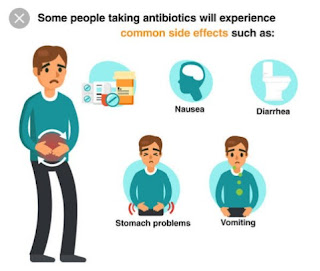Side effects of antibiotic medicines
Side effects of antibiotic
medicines
Antibiotic medicines are commonly used to treat bacterial infections. While they can be highly effective in killing harmful bacteria, they can also have side effects. Here are some common side effects associated with antibiotic medicines:
Diarrhea: Antibiotics can disrupt the natural balance of good bacteria in the gut, leading to diarrhea.
Nausea and vomiting: Some antibiotics can cause nausea and vomiting, which can be unpleasant.
Allergic reactions: Some people may be allergic to certain types of antibiotics, which can cause a range of symptoms, from mild rashes to severe breathing difficulties.
Resistance: Overuse or misuse of antibiotics can lead to the development of antibiotic-resistant bacteria, which can make future infections more difficult to treat.
Yeast infections: Antibiotics can also disrupt the natural balance of bacteria in the body, leading to an overgrowth of yeast and the development of a yeast infection.
Photosensitivity: Some antibiotics can make your skin more sensitive to sunlight, leading to a sunburn or rash.
Kidney and liver damage: In rare cases, some antibiotics can cause damage to the kidneys or liver.
It's important to follow your doctor's instructions when taking antibiotics and to report any side effects you experience. If you have concerns about the side effects of antibiotics, speak with your healthcare provider.




Comments
Post a Comment